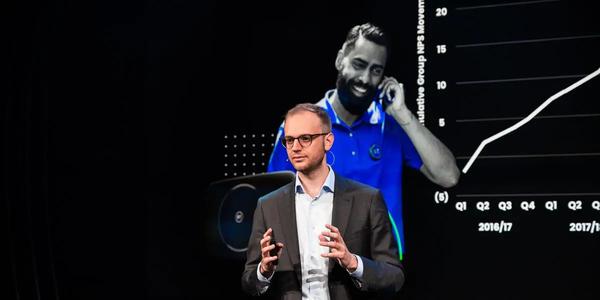Just one man has been with SAP over its entire 50-year history: co-founder Hasso Plattner. Now, the 78-year-old software visionary is making his last stand.
On Wednesday, Plattner will run for a final two-year transition term atop SAP’s supervisory board, an entity mandated by law in Germany that basically oversees the executive team. Leaders at SAP, for example, report to the supervisory board, not the CEO.
It’s a major milestone for the company given Plattner’s outsized role in helping to lead it through a still-shaky transition, as SAP continues to try to establish the same dominance it enjoyed in the on-premises environment in the era of the cloud. Once that term is complete, there’s no clear successor to take the reins.
“I have had the privilege to lead SAP for 50 years and have always done so with the long-term success of the company and its stakeholders in mind. I deeply value your trust and support for my final term,” he wrote in a note to investors.
However, the vote comes at a tumultuous time. It follows a damning report over Fioneer, a provider of software for the financial services and insurance industries that spun out from SAP in 2021, that suggests a conflict of interest on the part of Plattner. Despite assurances last year he would sell his large stake in the company, Plattner remained a major investor in March through the Hasso Plattner Foundation, according to a Financial Times report, which exposed the ownership structure of the company.
SAP is also reeling from a rocky response to the Ukraine crisis. The company moved slower than others in rolling back operations in Russia, leading to harsh words from Mykhailo Fedorov, the Ukrainian deputy prime minister, as well as pushback from shareholders.
And Plattner’s age is also of note. SAP mandates that no member of the supervisory board can be over the age of 75. The company, however, made an exemption for Plattner, according to spokesperson Joellen Perry.
“Exceptions can be made in certain cases if justification is provided. We are making such an exception for Hasso Plattner until we have found a successor for the chairmanship of the Supervisory Board, in the interest of the company,” she said in an emailed statement.
Despite the controversies, it’s likely Plattner succeeds in getting elected to a new term.
“It might be bumpy, but Hasso stays,” said Geoff Scott, head of Americas’ SAP Users’ Group. “What’s the alternative? There’s not anyone out there that I’ve seen campaign.”
But in a clear nod at critics of his long tenure in SAP’s orbit, Plattner made a series of governance changes on his way out, including shortening the tenure of the 18 supervisory board appointments to four years, which would theoretically prohibit long appointments like Plattner’s, and creating a new independent director role, a common staple within U.S. boards of directors.

He’s also poised to leave behind an SAP that, at least when it comes to workplace policies, is on the progressive side of the spectrum. Last year, the company said it would let employees work basically from wherever. But there have also been recent claims of harassment and discrimination against female executives. The company pushed back against the allegations, citing a zero-tolerance policy for such offenses.
In 2021, the amount of women in management positions increased to 28.3% of the total workforce. Of note, two women sit on SAP’s leadership team compared to five men. Its supervisory board, however, is much more diverse. And it was one of the few major software companies to, for a brief moment in time, have a female executive, Jennifer Morgan, leading the organization – albeit, in a co-CEO capacity.
Ceding the stage
Plattner isn’t the only enterprise technology luminary to cling to the company he founded. Marc Benioff, Larry Ellison and Michael Dell all appear to have had trouble letting go.
But as difficult as it is to imagine Oracle without Larry Ellison, it’s tough to imagine SAP without Plattner. And despite being bitter business rivals, with SAP never far from the tip of Ellison’s tongue, the two are quite similar.
Plattner and Ellison “created a segment of software that, up until that point, companies were writing it on their own,” said Scott.
While Plattner began SAP with four other ex-IBMers in 1972, he is the only one who remains influential at the organization. Dietmar Hopp left in 2005 after serving as CEO and chairman, Klaus Tschira passed away in 2015, Claus Wellenreuther departed in 1980 and Hans-Werner Hector left in 1997. Ellison only had two other co-founders, but neither is currently involved with Oracle.
Akin to Ellison, Plattner is SAP’s largest minority shareholder. He also has an equally deep interest in sailing. Ellison claimed Plattner once mooned him during a race. (Plattner denied this.) And, as chairman of the supervisory board, Plattner also still wields immense but behind-the-scenes influence over the software vendor, compared to Ellison’s still-visible role in leading Oracle as chief technology officer and executive chairman.
But his authority extends beyond SAP; Plattner is a force in German business and politics.
Hasso Plattner 1988 - SAP listed at the German Stock Exchanges in Frankfurt and StuttgartPhoto: SAP
He founded, and continues to fund, the Hasso Plattner Institute, an educational institution focused on computer science. The Hasso Plattner Foundation is also a big financial backer of digital health research, including a $15 million joint effort with Mount Sinai. Former Chancellor Angela Merkel reportedly even skipped watching Trump’s inauguration to go to the opening of a museum backed by Plattner.
Questions have been raised in the past, however, over how heavily SAP has relied on Plattner’s continued involvement. That guidance has, perhaps, become more paramount over the past few years as SAP grappled with a messy leadership change following the departure of former CEO Bill McDermott – one that saw the appointment of co-CEOs Christian Klein and Morgan, only for Morgan to leave soon after – and a difficult transition to the cloud that is only now starting to bear fruit. Still, it’s always difficult for a fresh leader to emerge under such an expansive shadow.
It seems, on the surface, that Plattner has found his transitional figurehead in Klein, who has worked at SAP since 1999. In some ways, Klein is slowly becoming the middle ground between McDermott and Plattner: deeply invested in the technology balanced by an evolving penchant for showmanship, complete with lofty claims about SAP’s stature in the software world. Klein, however, is unlikely to ever match McDermott’s reputation as a salesman.
Klein has already made a mark on the company, with cloud sales rising 31% last quarter, a noteworthy accomplishment given the first several years of his tenure were marked by the pandemic. But Klein has also had missteps that highlight his still-short experience as CEO.
When asked at an internal event in early 2021 about the lack of female representation on stage, Klein responded, “You can’t just have anyone on the stage who has no clue on the topic,” according to Bloomberg, a remark for which he later apologized. And, like other enterprise software vendors, SAP’s stock price continues to spiral, down 28% from this time last year.
In a world where founders appear intent on holding on to their prized possessions for as long as possible, it’s not surprising Plattner would look to even further extend his authority.
But as SAP ages in lockstep with Plattner, and the competition becomes younger and more fierce, now is the time for the company to get serious about handing the reins over to SAP’s next generation of leaders.









